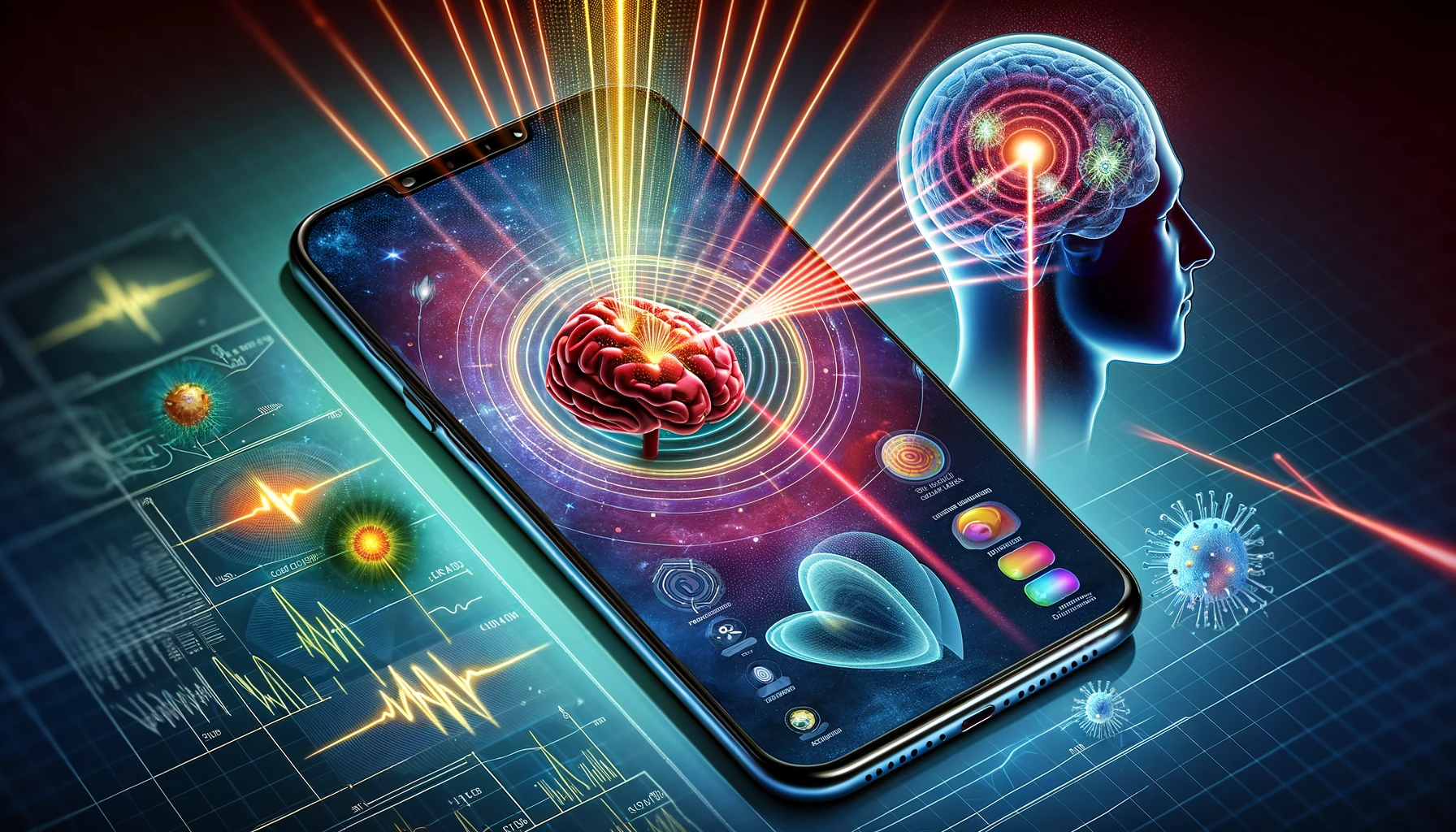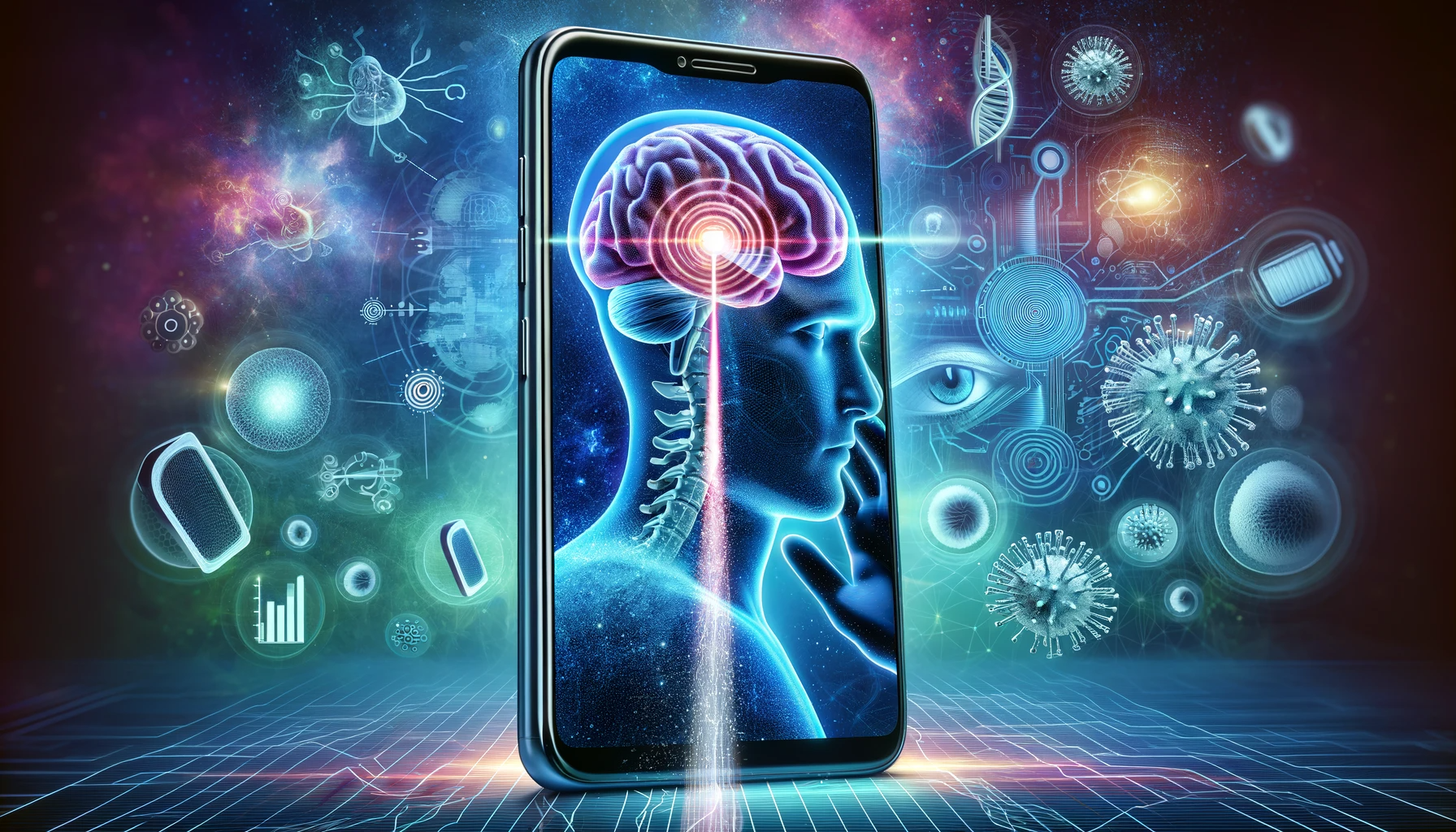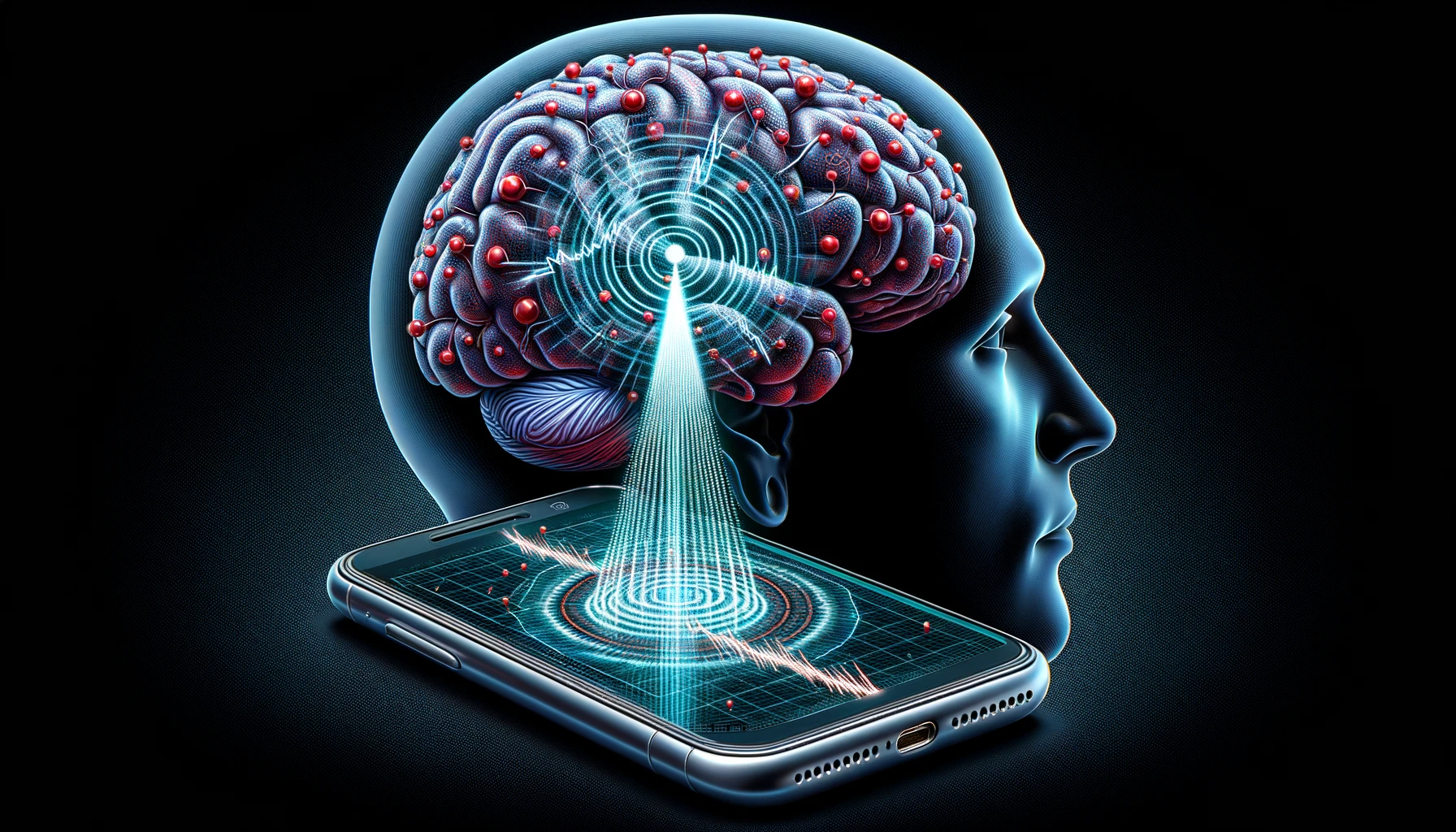In today’s digitally dominated world, our lives are increasingly entwined with mobile technology, bringing with it a constant exposure to electromagnetic radiation (EMR). This invisible companion, emitted by cell phones and other electronic devices, has become a ubiquitous part of our daily environment. While the convenience and connectivity offered by cell phones are undeniable, concerns about the potential health impacts of EMR are growing.
At the forefront of these concerns is the blood-brain barrier (BBB), a critical defense mechanism in our bodies. The BBB acts as a selective filter, guarding the brain against potentially harmful substances while allowing essential nutrients to pass through. Understanding how EMR interacts with and potentially affects the BBB is vital, as any compromise to this barrier could have significant implications for brain health.
This blog aims to delve into the scientific studies and findings surrounding the impact of EMR, specifically from cell phones, on the BBB. We will explore what current research tells us about this interaction and its potential consequences, providing insights into an issue that is as invisible as the radiation we are scrutinizing.
Understanding EMR and the Blood-Brain Barrier
What is Electromagnetic Radiation? Electromagnetic radiation from cell phones falls into the category of non-ionizing radiation. This type of radiation is typically perceived as less harmful compared to ionizing radiation (like X-rays and gamma rays), but its long-term biological effects, particularly from prolonged and close-range exposure, are still under investigation. The frequency of EMR from cell phones is in the microwave spectrum, which is also used in WiFi and other wireless communication technologies.
The Role and Importance of the Blood-Brain Barrier The blood-brain barrier is an intricate network of blood vessels and cells that selectively allows nutrients to enter the brain while blocking harmful substances. It’s a protective shield, crucial for maintaining the brain’s stable environment. The BBB’s integrity is vital for neurological health, as any disruption can lead to an increased risk of neurodegenerative diseases, brain inflammation, and other neurological disorders.
The Concerns with EMR and BBB Interaction The primary concern regarding EMR exposure and the BBB centers around the hypothesis that prolonged exposure to cell phone radiation could lead to a weakening or disruption of this barrier. If the BBB’s filtering capabilities are compromised, it could allow toxins, pathogens, or other harmful substances to enter the brain tissue, potentially leading to various neurological problems.
In this section, we will explore research and studies that have examined this interaction, providing insights into the current understanding of EMR’s potential impact on the blood-brain barrier.
Examining Research on EMR and Blood-Brain Barrier Permeability

Studies Linking EMR to BBB Disruption Numerous studies have attempted to uncover the relationship between cell phone radiation and the blood-brain barrier’s integrity. One of the pioneering studies in this field was conducted by Swedish researcher Leif Salford, who found that rats exposed to mobile phone radiation showed signs of leakage in the blood-brain barrier. This groundbreaking research, although initially controversial, opened the door for further investigations into how EMR might affect the BBB.
Recent Advances and Conflicting Findings As technology has advanced, so has the research methodology. Recent studies have utilized more sophisticated tools to assess the impact of EMR on the BBB. Some of these studies have suggested that EMR exposure can lead to increased permeability of the BBB, potentially facilitating the entry of harmful substances into the brain. However, it’s important to note that the scientific community has not reached a consensus, as other studies have reported negligible or no significant effects of EMR on BBB permeability. These conflicting findings highlight the complexity of the issue and the need for further research.
The Role of Duration and Intensity of Exposure A key factor in these studies is the duration and intensity of EMR exposure. Some research indicates that long-term exposure, even at lower intensities typical of cell phone usage, could have cumulative effects on the BBB. Conversely, short-term studies often do not show immediate or noticeable changes, suggesting that the potential impact of EMR on the BBB might be more subtle or delayed.
Considering the Varied Responses The response to EMR exposure can also vary based on individual differences and biological factors. For instance, the age and health status of an individual might influence how their BBB responds to electromagnetic radiation. This variability adds another layer of complexity to understanding the full impact of cell phone radiation on brain health.
In the next section, we’ll delve into the implications of these findings and what they could mean for cell phone users and public health guidelines.
Implications of EMR Impact on the Blood-Brain Barrier
Potential Health Concerns The possibility that EMR from cell phones could compromise the integrity of the blood-brain barrier poses significant health concerns. A weakened BBB could allow toxins, pathogens, and other harmful substances to enter the brain, potentially leading to neurological disorders, cognitive impairments, and increased risk of brain diseases. This concern is particularly acute given the ubiquity of cell phones and the increasing duration of exposure in daily life.
Understanding the Mechanism Understanding the exact mechanism by which EMR affects the BBB is crucial for developing protective strategies. Some hypotheses suggest that EMR could cause inflammation or oxidative stress, leading to a breakdown in the BBB’s protective functions. Unraveling these mechanisms is a key area of ongoing research, as it could lead to targeted interventions to mitigate potential risks.
Implications for Children and Adolescents Children and adolescents, whose brains are still developing, might be more susceptible to the effects of EMR on the BBB. This raises concerns about the growing use of wireless devices by younger populations. It also underscores the need for specific guidelines and protective measures for this demographic.
Revising Safety Standards and Public Health Guidelines The current safety standards and public health guidelines regarding cell phone radiation are based on thermal effects. However, if EMR is proven to affect the BBB non-thermally, it may necessitate a reevaluation and update of these standards to better protect public health.
Public Awareness and Precautionary Measures While the scientific debate continues, raising public awareness about the potential risks and encouraging precautionary measures, such as limiting exposure time and using hands-free devices, could be beneficial. This is particularly relevant for vulnerable groups or individuals with existing health conditions.
In conclusion, the relationship between cell phone radiation and the blood-brain barrier is a complex and evolving area of study. As research continues to provide more definitive answers, it is essential for individuals to stay informed and for public health policies to adapt accordingly.

Advances in Research and Future Directions
Recent Developments in EMR and BBB Studies Recent studies have employed advanced methodologies to assess the impact of EMR on the BBB. These include using higher resolution imaging techniques and more sophisticated biological markers to detect subtle changes in the BBB’s integrity. Some studies have also begun exploring the long-term effects of EMR exposure, considering factors like duration and intensity of exposure.
The Role of Epidemiological Studies Epidemiological studies have a crucial role in understanding the real-world implications of EMR on the BBB. By analyzing data from large populations over extended periods, researchers can identify patterns and potential health outcomes associated with cell phone usage. These studies are essential for translating laboratory findings into public health policies.
Technological Advancements and Safer Devices As research progresses, there is also a focus on technological advancements that could reduce EMR emissions from cell phones. Phone manufacturers and scientists are exploring ways to design devices that minimize radiation exposure while maintaining functionality. This includes the development of new materials and antenna designs.
Global Collaborative Efforts Given the global prevalence of cell phone usage, international collaboration is crucial in EMR research. Sharing data, resources, and expertise can accelerate the understanding of EMR’s impact on the BBB and lead to globally applicable safety standards and guidelines.
Educational Initiatives and Public Health Campaigns Educational initiatives and public health campaigns play a vital role in informing the public about the potential risks of EMR and promoting safer usage practices. These initiatives can be particularly effective when targeted towards schools and young adults, who are among the heaviest users of wireless devices.
Future Research Priorities Future research should prioritize longitudinal studies to understand the long-term effects of EMR on the BBB. Additionally, there is a need for more comprehensive studies that consider various factors such as age, gender, and individual health conditions. Research should also focus on developing practical solutions and protective measures to mitigate potential risks associated with EMR exposure.
In summary, while the impact of EMR on the blood-brain barrier remains a topic of active research, the growing body of evidence underscores the need for continued investigation, public awareness, and policy adjustments. As our reliance on wireless technology grows, ensuring its safe usage becomes increasingly important for public health.
Potential Mechanisms: How EMR Affects the Blood-Brain Barrier
Theoretical Underpinnings of EMR’s Impact on the BBB Electromagnetic radiation (EMR) from cell phones is hypothesized to affect the blood-brain barrier (BBB) through several biological mechanisms. These include oxidative stress, inflammatory responses, and alterations in cellular signaling pathways.
Oxidative Stress and Cellular Disruption One of the primary mechanisms is oxidative stress, a condition where there is an imbalance between free radicals and antioxidants in the body. EMR exposure has been shown to increase the production of reactive oxygen species (ROS), which can lead to oxidative stress. This stress can disrupt the tight junctions that form the BBB, making it more permeable. A study published in the journal ‘Brain Research’ demonstrated that prolonged EMR exposure led to an increase in brain oxidative stress markers in rats.
Inflammatory Responses Another mechanism involves inflammation. EMR can trigger an inflammatory response in brain tissue, which can subsequently impact the integrity of the BBB. Research in ‘Journal of Neuroinflammation’ found that EMR exposure increased the levels of pro-inflammatory cytokines in the brain, indicating an inflammatory response that could compromise the BBB.
Cellular Signaling Alterations Additionally, EMR may affect the BBB by altering cellular signaling pathways. Electromagnetic fields can interfere with normal cell signaling, leading to changes in the function and structure of the BBB. For instance, a study in ‘Environmental Health Perspectives’ noted changes in the expression of genes related to cell cycle regulation and apoptosis in EMR-exposed neuronal cells, suggesting potential impacts on BBB integrity.
Conclusion These mechanisms – oxidative stress, inflammation, and altered cellular signaling – provide a theoretical basis for understanding how EMR might affect the BBB. While more research is needed to fully elucidate these pathways, the existing studies highlight the need for caution and further investigation into the long-term effects of EMR exposure on brain health.
Implications for Health: Consequences of BBB Disruption Due to EMR
Immediate and Long-Term Health Risks The disruption of the blood-brain barrier (BBB) due to electromagnetic radiation (EMR) from cell phones poses significant health risks. In the short term, increased BBB permeability can lead to a transient influx of unwanted substances into the brain, potentially causing headaches, dizziness, and cognitive disturbances. Over the long term, the continuous disruption of the BBB is more concerning, as it can contribute to chronic neurological conditions.
Heightened Risks and Specific Conditions One of the most alarming implications of a compromised BBB is the increased risk of neurodegenerative diseases. Studies have suggested that a leaky BBB allows neurotoxins to enter the brain more easily, potentially accelerating the onset or progression of diseases like Alzheimer’s and Parkinson’s. A study in ‘Neuroscience Letters’ indicated a correlation between EMR exposure and increased beta-amyloid deposition, a hallmark of Alzheimer’s disease.
Furthermore, the permeability of the BBB due to EMR can heighten the risk of brain inflammation and associated complications. This inflammation can exacerbate conditions like multiple sclerosis and can even influence the severity of psychiatric disorders such as depression and anxiety.
Conclusion The potential health implications of BBB disruption due to EMR are wide-ranging and serious. While the immediate effects might be reversible and relatively mild, the long-term consequences could significantly impact brain health and overall well-being. This underlines the importance of further research to understand these risks and to develop strategies to mitigate the impact of EMR on the BBB and brain health.
10 FAQs on Cell Phone Radiation and Blood-Brain Barrier
1. What is electromagnetic radiation (EMR) from cell phones? EMR from cell phones refers to the non-ionizing radiation emitted during the use of wireless communication devices.
2. How does EMR affect the blood-brain barrier (BBB)? EMR can increase the permeability of the BBB, allowing potentially harmful substances to enter the brain.
3. What are the immediate effects of EMR exposure on the brain? Short-term effects can include headaches, dizziness, and cognitive disturbances.
4. Can long-term exposure to cell phone radiation cause serious health issues? Yes, chronic exposure can contribute to the development of neurodegenerative diseases like Alzheimer’s and Parkinson’s.
5. Is there a link between cell phone radiation and brain inflammation? Research suggests that EMR can lead to brain inflammation, exacerbating conditions like multiple sclerosis.
6. Can EMR from cell phones affect mental health? Yes, the disruption of the BBB by EMR might influence psychiatric disorders such as depression and anxiety.
7. Are children more susceptible to the effects of EMR? Yes, children are considered more vulnerable due to their developing brains and thinner skulls.
8. Can cell phone radiation cause cancer? While some studies suggest a potential link, the evidence is not conclusive.
9. Are there any specific studies highlighting the effects of EMR on the BBB? Yes, numerous studies, including those published in ‘Neuroscience Letters,’ have explored this connection.
10. How can one reduce the impact of EMR from cell phones? Limiting cell phone usage, using speakerphone or earphones, and avoiding keeping the phone close to the body can help reduce EMR exposure.








